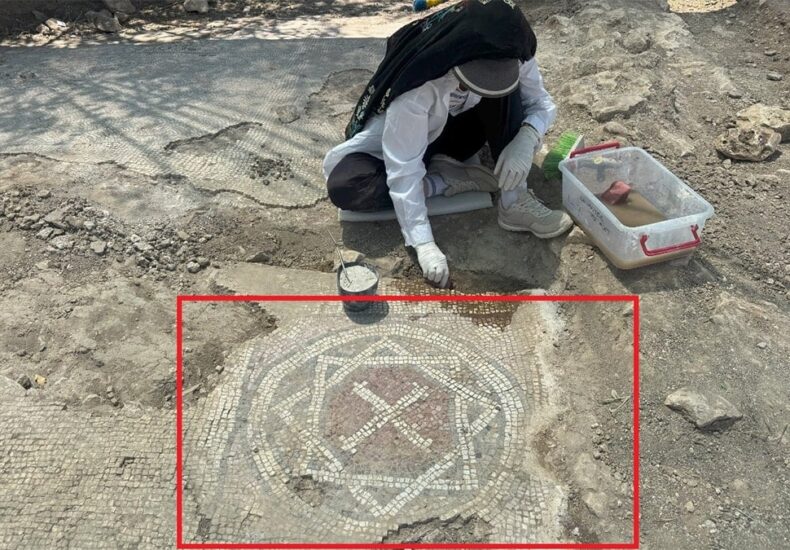
The Statue of Hestia, the Guardian Goddess of Aigai, from the Hellenistic Period, is Now on Display at the Manisa Museum
A 2.7-meter-tall marble statue of the goddess Hestia, discovered in 2005 during excavations at the ancient city of Aigai in western Türkiye, is now on display for the first time. Believed to be the only known Hestia statue from the Hellenistic period that has survived to the present day, it is showcased in a specially

119 Years of Excavations at Hattusa: New Discoveries in the Mysterious Area Between the Great Temple and Palace
In Boğazkale, Çorum Province, the ancient capital of the Hittites, Hattusa, has entered its 119th season of excavation. Led by Professor Dr. Andreas Schachner, the archaeological team is conducting in-depth research between the Great Temple and the palace, aiming to uncover new insights into the Hittite civilization’s different periods and their cultural heritage. A Century-Long

Star of David with a Cross Found in Roman-Byzantine Mosaic in Türkiye: Rare Symbolism Unearthed in Unexpected Discovery
The 35-square-meter mosaic also contains a six-line petition written in Ancient Greek In an extraordinary discovery in southeastern Türkiye, a Roman–Byzantine-era mosaic featuring a Star of David with a Christian cross embedded inside has been unearthed during a burial excavation in Ergani, Diyarbakır. The 35-square-meter mosaic floor, which also includes a six-line inscription in Ancient

A First in Anatolian Archaeology: 2,050-Year-Old Hexagonal Council House Unearthed in Laodicea
During the 2025 excavation season at Laodicea, an ancient city located in Denizli and listed on the UNESCO World Heritage Tentative List, archaeologists have uncovered a unique 2,050-year-old council house (bouleuterion) dating back to the reign of Roman Emperor Augustus. The architectural rarity stands out for its unusual hexagonal design—marking the first such example ever

Priene, Anatolia’s First Planned City, Poised for Permanent UNESCO World Heritage Listing
Located in Söke district of Aydın province, Türkiye, Priene Ancient City dates back to the 4th century BCE and stands as Anatolia’s earliest known planned city. With its strategic stone walls measuring 2 meters thick and a highly organized urban layout, Priene is now undergoing intensive efforts for permanent inclusion on the UNESCO World Heritage

New Clues of a Late Byzantine Production Zone Uncovered at Kadıkalesi (Anaia) in Western Türkiye
Archaeological excavations at the historic site of Kadıkalesi (ancient Anaia) in Kuşadası, western Türkiye, have revealed compelling traces of glass and ceramic production dating back to the 13th century. Led by Assoc. Prof. Dr. Suna Çağaptay from Muğla Sıtkı Koçman University, the excavations uncovered two new architectural spaces, one of which yielded pithos fragments—large storage
